My novel BEAR BAIT, the second in my Summer Westin mystery series, will be out October 2, so recently I’ve felt the need to revisit Olympic National Park and the surrounding national forests, which I used as the setting for that story. Olympic National Park, one of the most visited national parks in America, is–as the National Park Service website says–three parks in one. It has incredible mountains that seem to go on forever, vast forests of old growth and second-growth trees, including rain forests, and astounding beaches.
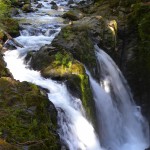
Sol Duc Falls
In my book, I invented a hypothetical situation in which a huge tract of forest service land is being transferred to the national park to serve as a continuous wilderness environment to stretch from the park’s interior mountains out to the ocean. Many Americans wouldn’t have a clue about why such a transfer might cause dissent, but while driving out on the Olympic Peninsula, I saw plenty of signs from the people who are already outraged by the amount of land that has been preserved in the park: No More Wilderness!, they screamed. We Want Working Forests!
The U.S. Forest Service is a division of the Department of Agriculture. Their mission is mostly to develop, protect, and harvest crops, and those crops include trees. (Let’s be honest; we use a lot of wood products in this country, so we do need to grow our wood crop.) Most of the national forests also include hunting areas, and a whole lot of them have mining activities as well. The National Park Service is a division of the Department of the Interior, and its mission is to protect and preserve the land and everything in it. So that means that in a national park, there can be no logging, no hunting, and no activities that destroy the landscape or threaten the environment. Now you can see how controversy might develop over such a land transfer, can’t you? That’s what I’ve sent my character Sam out to deal with. I’m just glad that bullets will be whizzing past her head and not mine.
So as I hike along the ridges on Hurricane Hill and out on Obstruction Point, I am grateful that someone long ago had the foresight to preserve this magical place for all Americans in the future. We listened to a talk about reintroducing fishers, a weasel made nearly extinct by fur hunters, to the park. As I watch deer and eagles and observe bear tracks in the mud, I am thankful that they will always have a place to live. The world would be so much less magical with only humans in it.
And as I watch the sun set over the Pacific out at Rialto Beach, I am happy to think that generations to come will be able to see this incredible landscape, too.
I salute all the government employees and volunteers who work to preserve our public lands and all the life in them. I believe that future life on earth—both wildlife and humans—will be thankful for all the wilderness we save. Don’t you?
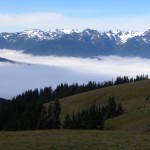
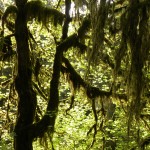
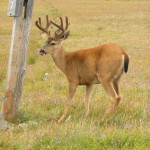
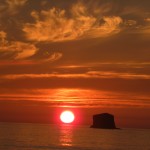
I love Olympic! One of my favorite places on the planet. Thanks for pointing out why we need these public places and why we should all work to protect them.